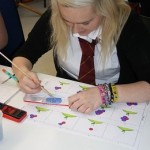 Mary Gibson – St Margaret’s Cluster Development Officer
Mary Gibson – St Margaret’s Cluster Development Officer
On Tuesday 12th February all primary staff from across St Margaret’s cluster, representatives from Cedarbank School and teachers from the English Department met to embark on the first of a two stage exercise to moderate and assess reading at Early, First, Second and Third level. Early and First level meetings took place in Howden St Andrew’s and St Nicholas’ primaries while Second and Third level staff worked in St Margaret’s Academy. The overall aim of this exercise was to establish a standard across the cluster of “secure” learning in one outcome.
The process involved using a template* to plan and deliver lessons to pupils who were secure at Lit1- 19a, Eng 1-19a, Eng 2-19a and Eng 3-19a. Passages were provided for selection according to the needs of the pupils involved. Continue reading Moderation and Assessment of Reading in St Margaret’s Cluster














